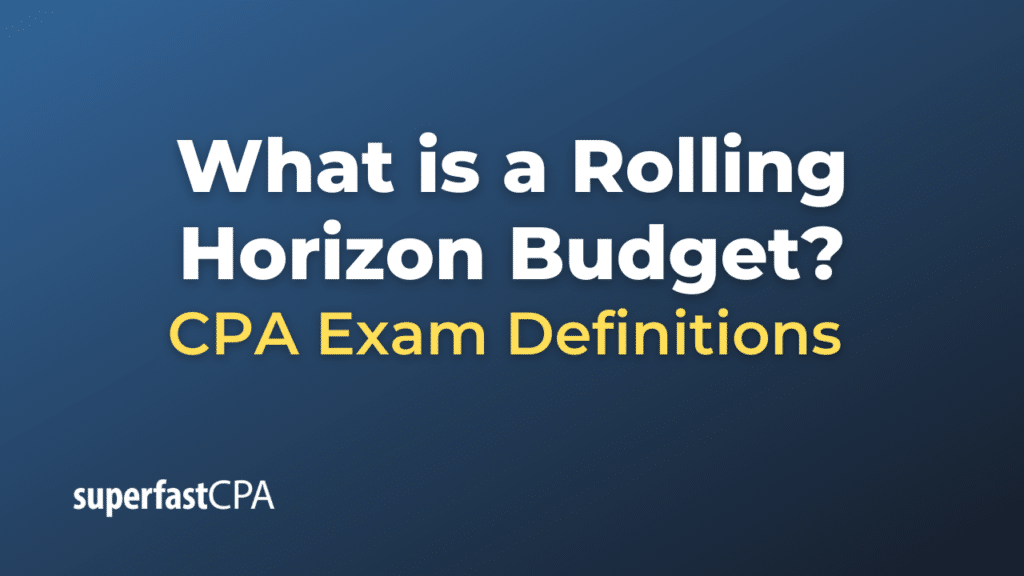Rolling Horizon Budget
A Rolling Horizon Budget is very similar to the Rolling Budget concept previously explained. In both approaches, budgeting is dynamic, and the budget gets updated regularly to always provide a forward-looking perspective. The term “rolling horizon” emphasizes the continuously shifting forward-looking window of the budget.
Here’s a breakdown of the Rolling Horizon Budget:
- Set Initial Budget: Just like with a rolling budget, you might start with a 12-month budget, for example, from January 2023 to December 2023.
- Periodic Review & Update: At regular intervals, which could be monthly, quarterly, etc., the elapsed period is dropped from the budget. So, at the end of January 2023, January gets dropped, and a new month (January 2024) is added to ensure a 12-month planning horizon.
- Adjustments: As you add the new month to the budget, you might adjust the projections for the entire horizon based on recent data, trends, and any changes in the business environment.
- Continuous Extension: This process continues throughout the year. By December 2023, with a 12-month rolling horizon budget, you’d be looking at a budget window from December 2023 to November 2024.
Benefits of a Rolling Horizon Budget:
- Adaptability: It allows companies to adjust their budgetary projections in response to actual performance and changing conditions.
- Relevance: Ensures that the budget is always current and relevant, offering insights into future performance based on the latest data.
- Strategic Agility: Companies can make proactive decisions instead of merely reacting once a year during a traditional budgeting process.
Drawbacks:
- Resource Intensive: Requires more frequent data collection, analysis, and management attention than static annual budgets.
- Potential Short-Term Focus: There’s a risk that the focus might become too short-term, potentially neglecting long-term strategic objectives.
In essence, a Rolling Horizon Budget is about always having a clear, updated view of the financial future and being prepared to adapt to changing circumstances. While it requires more effort and regular reviews, it offers greater flexibility and responsiveness in today’s dynamic business environments.
Example of a Rolling Horizon Budget
Imagine “FreshGroceries Inc.”, a retail chain that specializes in organic food. Given the dynamic nature of the food retail industry, with shifting consumer preferences, seasonal variations, and supplier volatility, FreshGroceries decides to implement a Rolling Horizon Budget with a 6-month window.
June 2023:
- Budgeted Sales for June: $500,000
- Actual Sales for June: $550,000
At the end of June, FreshGroceries reviews its performance and notes the increase in actual sales over the budgeted figures.
July 2023:
After reviewing June’s performance and considering the upcoming holiday season and a new advertising campaign set to launch, FreshGroceries adjusts its sales projections upwards for the next few months.
With the rolling horizon approach, as June concludes, it drops out of the budget, and December 2023 is added.
New Rolling Horizon Budget for July 2023 – December 2023:
- Budgeted Sales for July: Adjusted to $520,000 (from an earlier $500,000) based on June’s performance.
- Budgeted Sales for August: $530,000
- …
- Budgeted Sales for December (newly added month): $600,000, anticipating holiday sales and the impact of the new advertising campaign.
This continuous adjustment ensures FreshGroceries is always looking ahead six months, adjusting its strategies based on recent trends and new insights.
Key Takeaway:
With this rolling horizon budgeting approach, FreshGroceries doesn’t wait until year’s end or another arbitrary period to reassess and adjust. Instead, each month offers a chance for recalibration, ensuring that strategies, resources, and goals align with the most current data and market conditions.
This model offers agility to FreshGroceries, letting them nimbly adjust to the challenges and opportunities of the organic food retail industry. While it requires more management effort and oversight, the benefits of being adaptable in such a volatile market make the process worthwhile.













